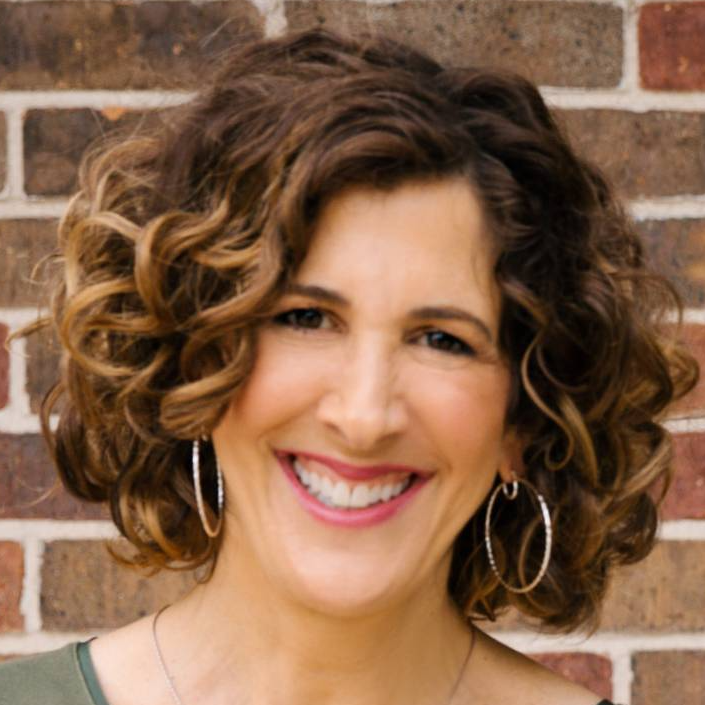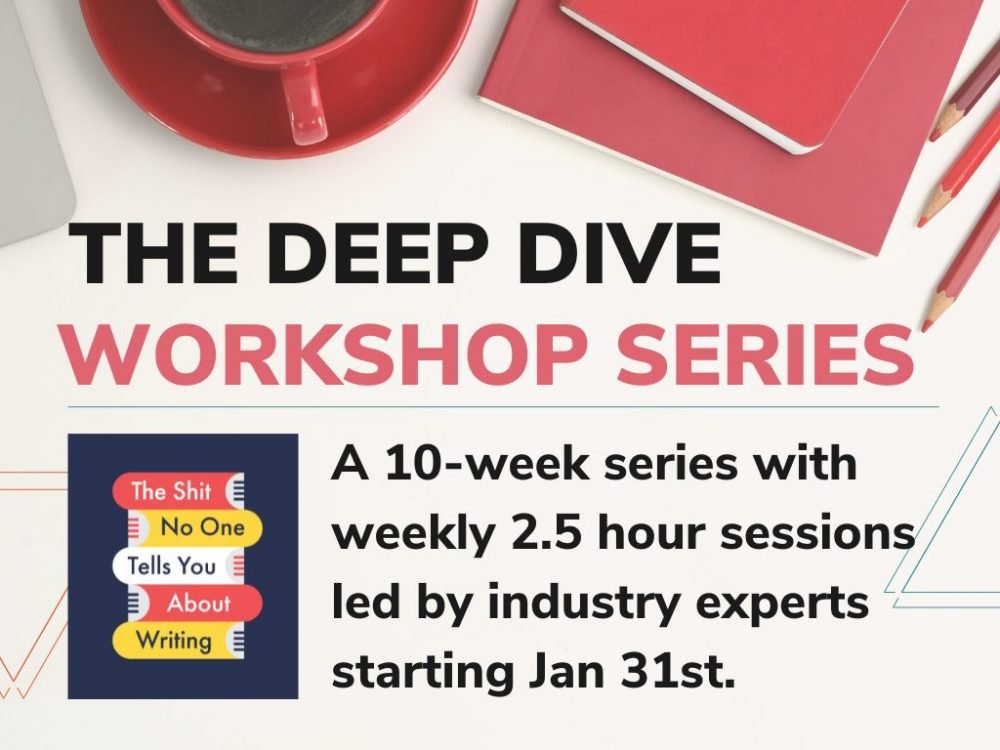
Ask the Editor is a column for your questions about the editing process and editors themselves. It’s a place to bring your conundrums and dilemmas and mixed feelings, no matter how big or small. Want to be considered? Learn more and submit your question.
This month’s Ask the Editor is sponsored by The Shit No One Tells You About Writing Podcast. Step up your writing game and meet fellow writers with The Deep Dive Workshop, a 10-week series from the podcast hosts of The Shit No One Tells You About Writing. Each week you’ll hear from expert writers and editors, followed by workshops led by Bianca, Carly or CeCe.
Question
I’m a beginning writer. I’ve been focusing on it for two years, though I’ve always dreamed of being a writer. In some ways, I feel like I’ve grown, but mostly I get overwhelmed by all I have yet to learn.
I read blog posts and craft books, thinking the advice sounds great and I can’t wait to try it. When I get to my writing, I freeze because I don’t know how to execute it. Two things I’ve been hoping to improve this year are characters and developmental editing.
This is where I’ve been stuck. I read about what needs to be looked at developmentally, but I don’t know how to recognize what needs fixing in my first draft or how to fix it.
I read my writing and know it is not up to par. It feels flat and dull, but I don’t know why or how. I’ll try to start revising and become overwhelmed with fatigue. It’s easier to say the story is too flawed, not working, and set it aside than to fix it. It’s not getting me anywhere.
I think my ideas are simple and lack complexity. They often lack in motivation and stakes. I’m a literal thinker, so it’s hard for me to be wildly creative. A few times, I’ve been told my writing sounds young. It makes me wonder if I’d be better at YA, but I love lighthearted women’s fiction and rom-com/chick lit. It’s been brought to my attention my writing lacks character emotion and voice.
After a few poor attempts at novels and then novellas, I’ve been working on short stories and flash fiction. When revising, it’s easier for me to see the whole picture and it feels less overwhelming.
I took to heart Ray Bradbury’s quote about writing 52 short stories because you can’t write 52 bad stories in a row. I changed it a little in that I’m doing short stories and flash fiction. I have drafted 26 short stories and 26 flash fictions (and have edited some of them).
Now, I have to figure out what to do next. More of the same (maybe 52 of each)? Or something a little longer, like a novelette or novella?
Do you have any advice on how I can learn to see and fix my story-level problems? Is it something that improves with time, and maybe I’m expecting too much of myself?
—Beginning
Dear Beginning:
Thanks for a complex question that I think reflects challenges common to a lot of writers—at every level.
Before I address your main question, there is one blanket suggestion I’d like to offer that applies to many of the concerns you wrote about: Take it easy on yourself.
You’ve brought up several areas where you’re struggling, but one common thread that jumps out to me is feeling beleaguered by self-doubt and self-judgment.
These pitfalls are as common among authors as any I know of. Show me an author who doesn’t doubt her ability or her story, flounder, or feel discouraged, and I will show you a delicious gluten-free pizza; it doesn’t actually exist.
The shortcomings you may perceive in your story and your writing are normal, especially for early drafts. Stories grow, deepen, and develop in the revision process; it’s where they come fully alive.
Try not to judge your initial draft by the standards of a finished one or published book. Revision is a process—often a long one. I regularly do three edit passes in working with an author or a publisher, sometimes more. This is after the author has already no doubt done a good amount of revision on their own to get to the final draft they turned in.
Remember that you never have to show one word of your writing to a soul until you are dead happy with it. Writing is your own private playground, and thinking of it as such—instead of as an arduous obstacle course you have to attempt in full view of the world—can help free you up in both your writing and revision.
Now let’s get a little more specific.
Edit first, revise second
You mention feeling overwhelmed by revising your work: That’s also common. I call this Revision Mountain, and when you are standing in the foothills looking up at the damned thing, it’s daunting. Where to even start?
Many authors plunge right in at the beginning and start revising—but that skips the crucial step of actual editing, and that’s often where overwhelm begins. Before you can effectively address what may not be working in your story, you have to assess what you have on the page.
In other words, as you rightly point out: first you must find any issues, and only then can you begin to fix them.
That means reading your work with an objective eye and identifying specific areas that may not be working as well as they could. It can also be helpful to get outside input from objective readers—trusted beta readers, crit partners, and (eventually) professionals—who can reflect back to you what you have on the page versus what intentions you may be subconsciously filling in on your own reads.
Then you diagnose why each particular element isn’t working.
For example, if you feel that a character doesn’t ring true, first identify specific places in the manuscript where that strikes you. Even if your frustrated answer is “Everywhere!” just go one page, one exchange, one development at a time. What feels as if it’s missing or “off” to you? What exactly isn’t coming across well here?
Is momentum lagging, or do stakes feel low, for instance? Is that because we don’t see what your character wants, perhaps? Is it not clear what’s driving them to attain it? Are their actions and behaviors not consistent with that? Do we not know what’s going on inside of them, so we have perspective and see how they process what happens to them? Every “problem” in your story has a concrete cause—editing means diagnosing it.
Only then, using all the benefit of the work you’ve been doing to learn this craft, do you figure out how to address that issue and weave it into the narrative—in other words, revision.
First you find it; then you fix it.
Then you repeat that process area by area.
Work from the foundation up
One reason revision so often goes awry for authors is the temptation to focus first on perfecting the prose. But as I always say, that’s like decorating the house before it’s finished being built.
I advocate—and use in my own editing work—a three-level process:
- Macroedits. These are the story’s main foundation: character, stakes, plot. I always start here; if these aren’t solid, the story won’t be either.
- Microedits. These are the essential elements that support the macroedit elements and make them maximally effective, like momentum, structure, suspense, tension, point of view, etc.
- Line edits. Fine-tuning the verbiage—have you conveyed the story in prose that’s lean, elegant, precise, and unique? This is the step many authors mistakenly start with (because it’s fun and sexy!) that often bypasses the core story elements.
Once you finish and feel you’ve plugged all the holes in the dam, you start over and do it again…and again…and again. I liken these repeated editing and revision passes to a master woodworker sanding his creation, running his hand over it pass after pass of the sander, feeling for ever finer imperfections, until it’s smooth as glass.
The process is simple, but the work of it can be anything but. And that’s common too. Editing and revision are most of the real work of writing. But one area at a time, step by step up Revision Mountain, you tighten, deepen, and hone your story.
(This extensive self-editing checklist offers specific questions to ask yourself that may be a useful guide.)
How to hone your editing and revision skills
You say that you are “literal,” not “wildly creative.” You may be glad to know that the chief skill that defines every successful author I have ever worked with isn’t their rampant creativity, but this diligent work in developing, deepening, clarifying, and fine-tuning those initial creative impulses. (In fact, I almost completely rewrote this letter after realizing my initial version didn’t effectively address your specific questions.)
Like writing, editing and revision are skills that take time to learn, and they develop only with practice—the way you are already doing with your flash fiction/short story writing and revising.
The other most effective way I know of is to analyze other authors’ work. I don’t just mean read it—I mean analyze it like an editor does, and reverse-engineer what makes it work. Amazingly, when you get into the habit of doing this, you will find these skills osmose into your artistic subconscious not just in your writing, but also in your editing and revision.
My favorite way to do this is to pick apart every single thing you read or watch—books, articles, TV shows, movies, hell, I often analyze commercials, songs, and ad slogans. What makes it effective—or not? Get granular—go back and reread or rewatch and notice where you react; then dissect how the author elicited that reaction in you.
Also, while finding a positive, constructive critique group can be helpful when you need objective feedback about your own writing, the real value of them lies less in the critique you receive than in the critique you give as you get practice with other people’s stories where you already have built-in objectivity in spotting what may not be working as effectively on the page as it could and why (finding and fixing; assessing and addressing).
You mention that two years in, you’re still learning. Thirty years into my editing career I feel the same way. In any complex, subjective pursuit like art you’ll always be learning.
And the more you learn, the more you see how much there is to learn—so ironically (and annoyingly), the better you get at writing, editing, and revising, often the worse you feel about your abilities.
“Mastering” (I put that in ironic quotes) this craft is a journey that never ends. Take time to appreciate how far you have already come. Two years—or a lifetime—is nothing when learning a skill as complex and challenging as creating fully realized worlds and people and orchestrating the infinite moving parts of story that bring something wholly yours into existence from your sheer imagination.
Take heart and keep going. You’re making more progress than you think.
This month’s Ask the Editor is sponsored by The Shit No One Tells You About Writing Podcast. Step up your writing game and meet fellow writers with The Deep Dive Workshop, a 10-week series from the podcast hosts of The Shit No One Tells You About Writing. Each week you’ll hear from expert writers and editors, followed by workshops led by Bianca, Carly or CeCe.

Tiffany Yates Martin has spent nearly thirty years as an editor in the publishing industry, working with major publishers and New York Times, Washington Post, Wall Street Journal, and USA Today bestselling and award-winning authors as well as indie and newer writers. She is the founder of FoxPrint Editorial and author of the bestseller Intuitive Editing: A Creative and Practical Guide to Revising Your Writing. She is a regular contributor to writers’ outlets like Writer’s Digest, Jane Friedman, and Writer Unboxed, and a frequent presenter and keynote speaker for writers’ organizations around the country. Under her pen name, Phoebe Fox, she is the author of six novels. Visit her at www.foxprinteditorial.com.


Thanks for the wonderful advice! I will be returning to this post often when I feel discouraged or at a loss with my writing projects (and I’m not a beginner but have been writing for years).
I’m happy to hear it’s fortitude-building, Andrea. 🙂 This is such an unpredictable business; it helps if we can remember to be our own best champions, even when our spirits may flag. Thanks for the comment.